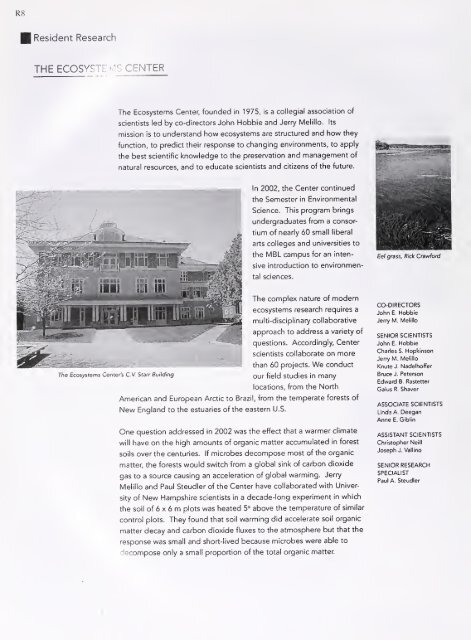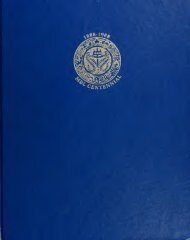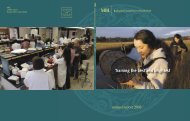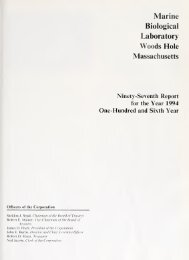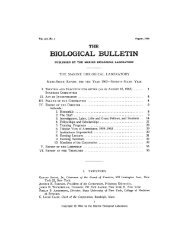View/Open - HPS Repository - Arizona State University
View/Open - HPS Repository - Arizona State University
View/Open - HPS Repository - Arizona State University
You also want an ePaper? Increase the reach of your titles
YUMPU automatically turns print PDFs into web optimized ePapers that Google loves.
R8<br />
Resident Research<br />
THE ECOSYSTT<br />
5 CENTER<br />
The Ecosystems Center, founded in 1975, is a collegia! association of<br />
scientists led by co-directors John Hobbie and Jerry Melillo.<br />
mission is to understand how ecosystems are structured and how they<br />
function, to predict their response to changing environments, to apply<br />
the best scientific knowledge to the preservation and management of<br />
natural resources, and to educate scientists and citizens of the future.<br />
Its<br />
In 2002, the Center continued<br />
the Semester in Environmental<br />
Science. This program brings<br />
undergraduates from a consortium<br />
of nearly 60 small liberal<br />
arts colleges and universities to<br />
the MBL campus for an intensive<br />
introduction to environmental<br />
sciences.<br />
Eel grass. Rick Crawford<br />
The Ecosystems Centers C V. Starr Building<br />
The complex nature of modern<br />
ecosystems research requires a<br />
multi-disciplinary collaborative<br />
approach to address a variety of<br />
questions.<br />
Accordingly, Center<br />
scientists collaborate on more<br />
than 60 projects.<br />
We conduct<br />
our field studies in many<br />
locations, from the North<br />
American and European Arctic to Brazil, from the temperate forests of<br />
New England to the estuaries of the eastern U.S.<br />
One question addressed in 2002 was the effect that a warmer climate<br />
will have on the high amounts of organic matter accumulated in forest<br />
soils over the centuries. If microbes decompose most of the organic<br />
matter, the forests would switch from a global sink of carbon dioxide<br />
gas to a source causing an acceleration of global warming. Jerry<br />
Melillo and Paul Steudler of the Center have collaborated with <strong>University</strong><br />
of New Hampshire scientists in a in<br />
decade-long experiment which<br />
the soil of 6 x 6 m plots was heated 5 above the temperature of similar<br />
control plots. They found that soil warming did accelerate soil organic<br />
matter decay and carbon dioxide fluxes to the atmosphere but that the<br />
response was small and short-lived because microbes were able to<br />
decompose only a small proportion of the total organic matter.<br />
CO-DIRECTORS<br />
John E. Hobbie<br />
Jerry M. Melillo<br />
SENIOR SCIENTISTS<br />
John E Hobbie<br />
Charles S. Hopkinson<br />
Jerry M. Melillo<br />
Knute J. Nadelhoffer<br />
Bruce J. Peterson<br />
Edward B Rastetter<br />
Gaius R Shaver<br />
ASSOCIATE SCIENTISTS<br />
Linda A- Deegan<br />
Anne E. Giblin<br />
ASSISTANT SCIENTISTS<br />
Christopher Neill<br />
J.<br />
Joseph Vallino<br />
SENIOR RESEARCH<br />
SPECIALIST<br />
Paul A Steudler


